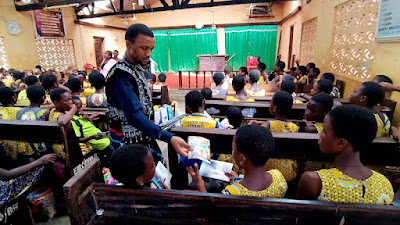 |
| Christian Elongué during a reading workshop at Nungua Methodist School (Ghana), Dec. 2022 |
1: Create more literary prizes for children books in African languages
By encouraging and incentivizing authors and publishers to consider young adult and children’s literature, we can expose young people to different cultures to give them a more well-rounded literary experience.
2: Establish stronger network of literary translators in African languages
Translation ensures that young readers have the chance to read brilliant stories from around the world in their traditional language. It also encourages a greater variety in the type of texts children are able to enjoy. Genres such as comic and graphic novels arguably aren’t as well established in Africa as they are in Asian cultures. So, translation has enabled African youth – like me – to experience a different genre such as Manga and Anime books, Japanese comic books and graphic novels that are almost always published in black and white.
However, translating children books is not an easy task. Emma Ramadan shared the experiences and lessons learned by five translators of children books while the award-winning translator Daniel Hahn shared his thoughts on the art of translating picture books. Since English is the most spoken language in the word, it is easier to find Anglophone translator of children’s books than for other languages, especially African languages. There is therefore a need to establish a network of literary translators specialized in African children’ literature and equipped with the required skills, sensitivity and technicity to translate children books and stories.
Even though there are literary translators in Africa (Bakwa, World Kid Literature etc.), very few are specialized in children’ literature and most are not organized as a network. Muna Kalati, the network of children book specialists in Africa, together with World Kid Literature are pushing for the creation of such a network where translators of children books could share experiences, challenges and opportunities. We believe that translated books can have the most insight to other cultures because people who are native to that setting are the ones who are writing the stories.
3: Increase investment in publishing of multilingual books for children
Reading in their own language will ignite children’s curiosity and desire to want to read more. Some children see their language in writing for the first time and it boosts their self-esteem.
4: Produce more multilingual books for children through open digital licensing
Open digital licensing has the potential for achieving quantity through sharing of openly licensed images. This offers a chance for communities to develop their own literacy materials and include indigenous knowledge for future generations. We, therefore, recommend a community approach to the development and use of children’s storybooks.
5: Organise more writing workshops on African languages
Educators need to participate in writing storybooks for children because they are the ones who deal with their literacy in systematic ways. Additionally, greater investments should be made towards building public libraries and communities around them encouraged to use them.
In summary, we must acknowledge that access to children books in African languages is still a big problem for many potential readers and book-buyers because of the high-cost implications for publishers, writers’ visibility and readers’ perception about the privileges and benefits ascribed to local languages. However, the application of these five key ideas could help ensure there is an increasing body of intercultural stories and books in languages that children are familiar with and about topics that they can respond to.
***
This is the fourth in a series of four posts. Click here for the first, second, and third posts.
About Christian Elongué
Ngnaoussi Elongué Cédric Christian is an author in children literature and researcher on African video games. Dismayed by a lack of black characters in books available to African children, Elongué founded munakalati.org in 2017 with the goal of building international recognition for African children’s book. Christian has supported several researchers to undertake research on African Children literature. In 2019, he authored An Introduction to Children Literature in Cameroon, the first scientific book on children’s book industry in Cameroon. Prior to that, he worked with the French National Centre for Children’s Literature. He serves on the Executive Committee of the International Board on Books for Young People (IBBY International), and is the founding member and Vice-President of IBBY-Cameroon. In 2021, he was one of the 30 Global literacy Champion and innovators by the International Literacy Association and his work on foundational learning and numeracy (FLN), which impacted at least 3032 African children, was covered by LeMonde, RFI, etc. An avid lifelong learner, he holds three master’s degrees on children literature (University Senghor, Alexandria), Instructional Design (University of Lille, France) and in African Studies (University of Dschang) with 46 international certifications from top global universities.
About Muna Kalati
Muna Kalati was founded in 2017 to promote more diversity, equity and inclusivity in the cultural news ecosystem, especially the children book industry. In 2018, we started publishing Muna Kalati magazine, which is becoming a reference for writers, publishers and illustrators of children’s and Young Adult books. MK is the first and only media network of literary journalists, authors and publishers promoting African children literature. Through our digital platforms, reading workshops, advocacy campaigns and bilingual magazine, we increase access to culturally-relevant resources and information on children books to thousands of children and families in Africa, Europe, US and the diaspora. Thus, we facilitate intercultural communication and improve literacy by exposing kids to African and black children's books and educational materials. By promoting diverse books, we are reducing ethnocentrism and eurocentrism and improving international understanding, preparing kids to be global citizens and changemakers well equipped to confront the increasing volatility, uncertainty, complexity and ambiguity of our contemporary society.

No comments:
Post a Comment